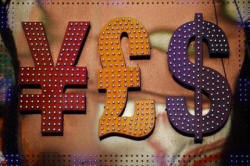|
The
dollar index hit a one-month low last week after the People's
Bank of China unexpectedly devalued the yuan, dampening
expectations that the Federal Reserve will raise interest rates
in September.
But after the PBOC set the yuan slightly above its fixing rate
on Friday, soothing fears that Beijing was intent on a bigger
devaluation, markets have once again turned their attention
monetary policy diverges between the world's major economies.
Against the euro, expected to remain weak as the European
Central Bank pressing on with a 1 trillion euro asset-purchase
program, the dollar traded at its strongest in five days,
reaching $1.1063 per euro before easing a little to $1.1098,
still up around 0.1 percent on the day.
With little in the way of major U.S. data on Monday or Tuesday,
investors are awaiting Wednesday's inflation data and minutes
from the Fed's latest policy meeting.
"We suspect that the data this week, especially the core CPI
(consumer price inflation) print, as well as indications from
the minutes..., will allay concerns that the Fed may delay
lift-off beyond September.," said Credit Agricole's head of G10
FX strategy in London, Valentin Marinov.
"We think the policy divergence trade is alive and well and the
dollar should remain the main beneficiary of that."
The dollar index was 0.2 percent up on the day at 96.711, but
still not far from the one-month trough of 95.926 reached last
week.
"People have the China move last week still in the back of their
minds... but our view is that (the Fed is) still on course to
raise rates in September or October."
After data showed Japan's economy shrank in the second quarter,
adding pressure on Prime Minister Shinzo Abe to step up a
stimulus drive, the dollar gained 0.2 percent to trade at 124.53
yen.
With emerging market currencies remaining wobbly, some analysts
said the yen was being kept from falling lower by its safe-haven
status.
Market watchers are divided over whether the Bank of Japan will
announce more policy easing in October. That could put the onus
more on the government to offer more fiscal support.
Data from the U.S. financial watchdog on Friday showed
speculators increased their yen short positions in the week to
last Tuesday to the highest level since June. That suggests many
may need to buy back the yen in the future.
(Additional reporting by Hideyuki Sano in Tokyo; Editing by Toby
Chopra and John Stonestreet)
[© 2015 Thomson Reuters. All rights
reserved.] Copyright 2015 Reuters. All rights reserved. This material may not be published,
broadcast, rewritten or redistributed. |
|





